#Wilcox Manager
Explore tagged Tumblr posts
Text
The Shell: The Landing Part 2
Part 1
"Come on dude, you've been helping us tremendously, at least grab a beer or something," insisted Colin as he tried to persuade the Forest Ranger to take a sip of the cold beer

"Heh, sure, not like my boss is around or something," said the Forest Ranger as he loosened himself up and grab the tempting cold beer from Colin's hands. Colin grinned with malice as the first sip of the beer instantly froze the ranger, the bottle shattered to the forest ground as venom already spread all over his system. Colin then easily opened the Ranger's mouth and then the alien starts to climb out from his throat and then traveled upwards to enter the ranger's nose. When it finished wrapping itself around the ranger's brain and then absorbed the memories, it oozes out from the ranger's ear and then flopped to the forest ground where it started to expand itself as the shell's creation process started. Minutes later, the perfect replica of the ranger, albeit naked, stand up with a smug grin next to the ranger.
"Guess I need to take what's mine, Ranger," said the replica with an eerie smile plastered on his face as he started to undress the real Ranger from his uniform. The boots with the lengthy, damp black socks, the pants that framed the ranger's hairy muscle ass so well alongside the sweaty white briefs, the wifebeater underneath the worn out uniform shirt and jacket and at last the musky hat that once adorned the Ranger head is now in the possession of the shell that wears it with pride and smugness that's never been seen before from the usually stoic and stern Ranger
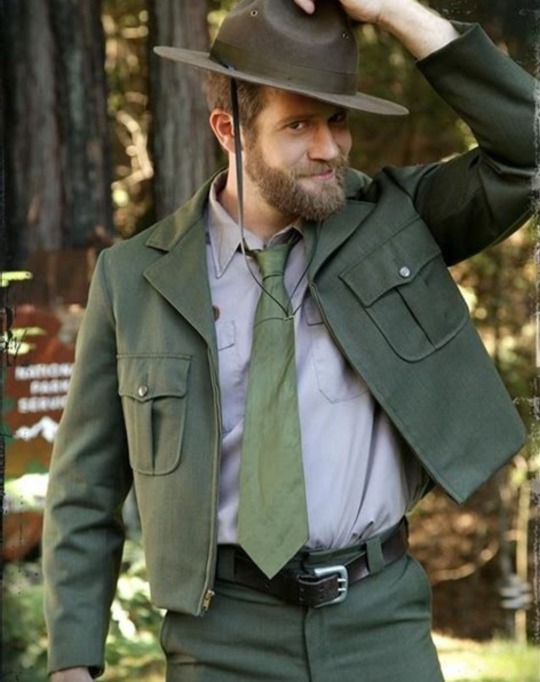
"Ranger Stephen Henderson at your service. Ohhh......I love how knowledgeable he is about this forest. Lots of delicious bodies for our pack scattered in places I, as the Ranger, fully aware of if you want to explore the woods now. What do you think, Colin? Should we tell Ryle about this?"
"Oh we definitely should, Ranger Henderson. I know Ryle will be elated if you can show us where to find the next bodies,"
"Well, what if we bring one more body to him? There's this jogger watching us as we're speaking now looking all horrified right there," the Ranger pointed out to the person around 300 meters behind Colin that has witnessed everything
The jogger tried his best to outrun the youthful Colin and the street-smart (or forest-smart) Ranger Henderson, but he eventually succumbed to the same fate as the real Ranger and the real Colin when this alien replica of himself eventually snapped his neck in the final act of taking over his identity

"Let's head back to meet Ryle and strategize which folks we should convert before we head back to the city," advised the Ranger to both Colin and the recently-added Marco, the town's bartender that just wanted to get some fresh air but unfortunately took his final drag of fresh air witnessing an impostor stealing his identity and life
With the help of the Ranger's knowledge of the forest, the takeover turned out to be even much more efficient and rewarding as the Ranger directed them to the more fit and powerful human to be disposed of and cloned as shell into. As it stands, the pack led by Ryle Adams leave the forest in three differing cars, the first one filled by Ryle, Colin and the two local college jocks named Austin and Wes


Then, the second car, a huge pickup truck is filled by Ranger Henderson, Marco the bartender, Paulie the town cabin-builder and the owner of the truck alongside his buddy and recently turned in-law as their kids married each other, Sheriff Jeff Wilcox.
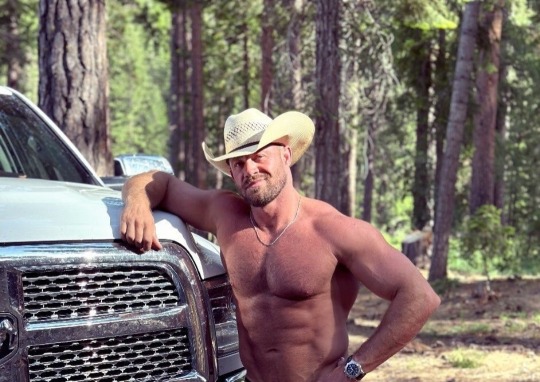
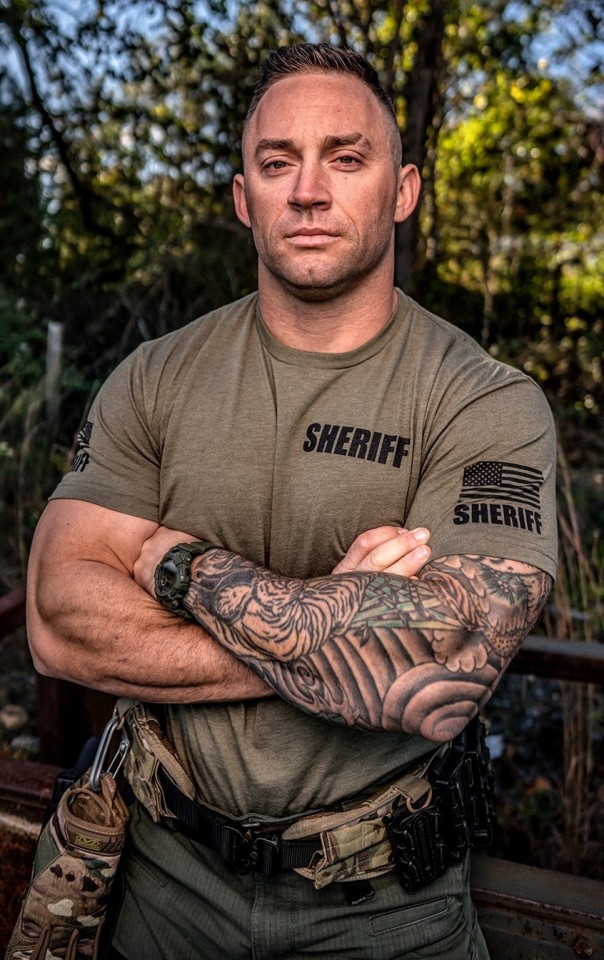
The final car, and quite an unexpected yet very much welcomed outcome, filled by 4 soldiers from the military base in the opposite town of the other 8 shells. The soldiers were on a quick unathourized trip out from the base to enjoy the pristine wildlife outside of their base. They managed to do so because the most senior one among them is the nephew of the Major and while the trip has been fun and stress-relieving for them, they certainly would never expect that it would be their last trip, ever. When the Ranger came out to the soldiers camping ground asking for help, they walked into a trap without knowing as they found themselves paralyzed from head to toe all in a sudden. They did not realize that they stepped on aliens on the forest ground that soon slithered themselves stealthily to numb their bodies to the point of paralysis. Then, the ranger wickedly shoved four slithering alien right to their ear canals and soon, they experienced what could only be described as progressive amnesia as their memories absorbed by the alien presence in their brain. As soon as they sucked the memories dry, the alien slithered out with pink-ish glow from the soldiers ear and flopped to the ground where it started to replicate the soldiers and that's when the soldiers also encountered their final fate soon after the replica reached its full state of replication, resembling perfectly the 4 unfortunate soldiers not only physically, but also mentally

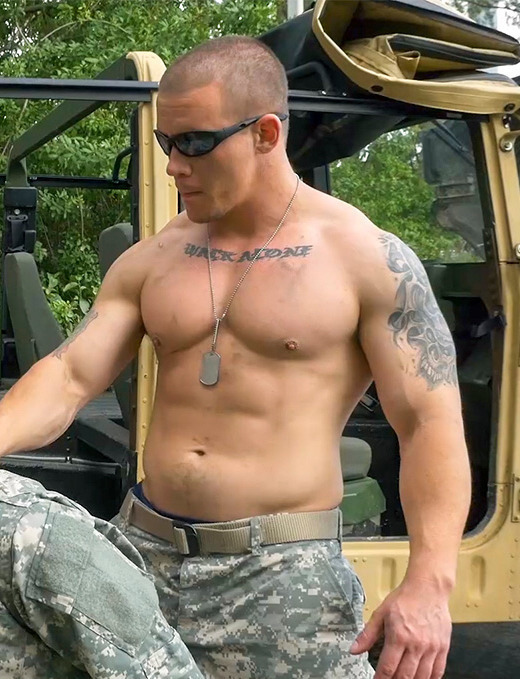
So, while the 8 shells will get back to the town and inform the motherships of the town exact coordinate for a more precise landing of the next batches, it will also inform of another coordinates which is the military base that didn't even appear in the mothership detection. One reckless trip of the 4 soldiers will become a heavy price to pay by humanity as when the landing reached its full-scale, that entire base will be turned upside down and will become the base of the invading enemy without anyone knowing
272 notes
·
View notes
Text
Goldstein and Mahmoudi point to what, on appearance, is a relatively new phenomenon: namely the use of digital technologies in contemporary forms of surveillance and policing, and the way in which they turn the body into the border. [...] [T]he datafication of human life becomes an industry in its own right [...] [with the concept of] “surveillance capitalism” - a system based on capturing behavioral data and using it for commercial purposes [...] [which] emerged in the early 2000s [...].
In contrast, scholarship on colonialism, slavery, and plantation capitalism enables us to understand how racial surveillance capitalism has existed since the grid cities of sixteenth-century Spanish Mexico (Mirzoeff 2020). In short, and as Simone Browne (2015, 10) has shown, “surveillance is nothing new to black folks.” [...]
[S]urveillance in the service of racial capitalism has historically aided three interconnected goals: (1) the control of movement of certain - predominantly racialized - bodies through means of identification; (2) the control of labor to increase productivity and output; and (3) the generation of knowledge about the colony and its native inhabitants in order to “maintain” the colonies [...].
---
Identification documents and practices can, like so many other surveillance technologies, be traced back to the Middle Passage [...]. [T]he movement of captives was controlled through [...] slave passes, slave patrols [...]. Similar strategies of using wanted posters and passes were put in place to control the movement of indentured white laborers from England and Ireland. [...]
Fingerprinting, for example, was developed in India because colonial officials could not tell people apart [...].
In Algeria, the French dominated the colonized population by issuing internal passports, creating internal limits on movement for certain groups, and establishing camps for landless peasants [...]. In South Africa, meanwhile, the movement of the Black population was controlled through the “pass laws”: an internal passport system designed to confine Black South Africans into Bantustans and ensure a steady supply of super-exploitable labor [...].
On the plantation itself, two forms of surveillance emerged - both with the underlying aim of increasing productivity and output. One was in the form of daily notetaking by plantation and slave owners. [...] Second, [...] a combination of surveillance, accounting, and violence was used to make slave labor in the cotton fields more “efficient.” [...] [S]imilar logics of quotas and surveillance still reverberate in today's labor management systems. Finally, surveillance was also essential to the management of the colonies. It occurred through [...] practices like fingerprinting and the passport [...]. [P]hotographs were used after colonial rebellions, in 1857 in India and in 1865 in Jamaica, to better identify the local population and identify “racial types.” To control different Indian communities deemed criminal and vagrant, the British instituted a system of registration where [...] [particular people] were not allowed to sleep away from their villages without prior permission [...].
---
In sum, when thinking about so-called surveillance capitalism today, it is essential to recognize that the logics that underpin these technologies are not new, but were developed and tested in the management of racialized minorities during the colonial era with a similar end goal, namely to control, order, and undermine the poor, colonized, enslaved, and indentured; to create a vulnerable and super-exploitable workforce; and to increase efficiency in production and foster accumulation. Consequently, while the (digital) technologies used for surveillance might have changed, the logics underpinning them have not.
---
All text above by: Sabrina Axster and Ida Danewid. In a section from an article co-authored by Sabrina Axster, Ida Danewid, Asher Goldstein, Matt Mahmoudi, Cemal Burak Tansel, and Lauren Wilcox. "Colonial Lives of the Carceral Archipelago: Rethinking the Neoliberal Security State". International Political Sociology Volume 15, Issue 3, September 2021, pages 415-439. Published June 2021. At: doi dot org slash 10.1093/ips/olabo013. [Bold emphasis and some paragraph breaks/contractions added by me. Presented here for commentary, teaching, criticism purposes.]
#abolition#landscape#colonial#imperial#ecology#tidalectics#caribbean#archipelagic thinking#carceral geography#intimacies of four continents#multispecies#geographic imaginaries
346 notes
·
View notes
Text
Last week, during an appeals-court hearing dealing with the unlawful firing of Gwynne Wilcox, an N.L.R.B. member Trump targeted in February, a Justice Department lawyer was forced to confront the reality that Humphrey’s Executor remains the law of the land—the President’s wishes notwithstanding. Applying that nearly century-old precedent, U.S. District Judge Beryl Howell, who reinstated Wilcox and declared her firing unlawful, couldn’t help but note in her ruling that the President’s actions were monarchic in nature. “A President who touts an image of himself as a ‘king’ or a ‘dictator,’ perhaps as his vision of effective leadership, fundamentally misapprehends the role under Article II of the U.S. Constitution,” Howell wrote, in reference to a White House post on X which depicted Trump with a crown on his head alongside the words “LONG LIVE THE KING.”
That’s the natural end point of Roberts’s vision of Presidential supremacy. In this vision, no one who exerts even a modicum of oversight or authority under some law is safe—not inspectors general (fired), not the head of the Office of Special Counsel (fired), not any of the members of independent agencies Trump doesn’t care for, like Wilcox, Bedoya, or Slaughter (fired, fired, and fired). The apolitical Civil Service isn’t spared, either. “Article II of the United States Constitution vests the President with the sole and exclusive authority over the executive branch, including the authority to manage the Federal workforce to ensure effective execution of Federal law,” reads an order Trump signed ahead of mass firings at agencies across the government. In urging a Maryland federal judge to limit a ruling ordering the reinstatement of thousands of wrongfully terminated probationary employees, the Justice Department echoed this theme, requesting a decision that is “narrowly tailored to preserve the Executive’s authority to exercise its Article II authority over the Executive Branch.” Speaking with Bloomberg after her dismissal, Slaughter observed that not even the chairman of the Federal Reserve Board is safe under the maximalist regime Trump is advancing. “There is no legal difference between Jerome Powell and me,” she said. “If the president can legally remove me, he can legally remove Jerome Powell.”
That’s not even touching what’s happening at the Department of Justice and the F.B.I., where Trump is undoubtedly seizing on Roberts’s generous language in the immunity decision to install loyalists, fire career officials and others involved in the January 6th prosecutions, and micromanage investigations. By implication, all of these actions bear the Chief Justice’s stamp of approval—and, because they’re seen as part of the President’s “core constitutional powers,” neither Congress nor the courts can do anything about it. The President enjoys “exclusive authority over the investigative and prosecutorial functions of the Justice Department and its officials,” according to Roberts’s decision in Trump v. United States. As Jack Goldsmith, a scholar of executive power, has pointed out, the real import of Roberts’s language here is not that it gave Trump a shield from prosecution (though that was the immediate result); the ruling gave Trump a “sword” to brandish across the executive branch—which is exactly why laws, institutions, and what remains of the constitutional order are being slashed to bits in Trump’s Washington now.
How John Roberts Has Empowered a Lawless Presidency
25 notes
·
View notes
Text
𝐈 𝐃𝐫𝐞𝐚𝐦𝐭 𝐨𝐟 𝐇𝐞𝐚𝐯𝐞𝐧 (𝐗𝐈𝐈𝐈)
previous • next
"A lonely moon craving for the radiant sun." In which a certain girl catches the attention of a prideful billionaire playboy as they both attempt to find their way in the world. (I haven't seen many fics explore Bruce in his formative years, so I thought I'd share my take on them, of course with romance.)
wc: 1352

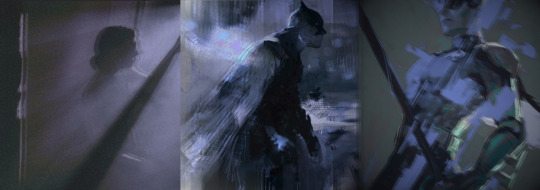

The third year of Gotham University, and y/n had all but been cut off from any ties she had to the Academy. Bruce had fallen off the face of the Earth, and Harvey busied himself with making the dean’s list for the third year in a row.
Gotham University was no Ivy League, but that’s not to say it didn’t provide a decent education. Rooming with the notorious Harleen Quinzel for the second year, y/n had found normalcy in the unorthodox life that seemed to follow her.
Harleen had been dating many men on and off, but this new guy seemed to have stuck. This had been her longest relationship yet, and that meant Harley spent way too much time outside of the dorm than in it. Of course, this stirred much rumor about her sexual tendencies, but y/n always ignored it.
Impressions were so malleable, and people so foolish. It didn’t take long for the entire psychology student body to think she’d been sleeping with her professors for her grades, because so many people refused to believe a blonde, blue-eyed bimbo could ace her classes.
y/n on the other hand, was too busy juggling a different obstacle to be concerned with any such gossip. It was true, that Falcone was imprisoned, and it was also true that all his operations had been halted. But Falcone was the least of her worries now. Ever since she had talked to Dr. Crane, he’d kept calling her back every month for a little discussion.
At first, she thought the conversations were his gesture of kindness, knowing of her traumatizing ordeals and wanting to ease her pain. But there was no compassion in his intention. Dr. Crane was as notorious as it came, for that sack she had found was his true face. The man was mad, with a lust for controlling others.
He wanted reparation for the ordeal he had to overcome in his childhood, he wanted to conquer fear as so many men do. But with his expertise, Crane was able to do just that with a fear toxin. He ran experiments with his patients to perfect the concoction, but he became too greedy. No longer could he confine his work to Arkham, he needed a means of testing it in Gotham.
y/n was the perfect means of transportation, for she had such lengthy experience working for Wilcox. Crane had grown fond of the young girl, enough that he mistook her obedience for trust. So often he’d forget that she was suffering, rather than relishing in the pain of others.
In due time he thought she would understand the satisfaction that the pain of others brings about. They had both been wronged, so it was about time that someone else felt the taste of blood that coated their mouths. He always thought they were one in the same, but y/n knew they’d never be such.
She was disgusted, having to inject innocent men and women with the toxin and record how their pitiful faces morphed into a fearful panic. It was either her or them, and it felt so selfish having to trade her safety for their pain.
She’d been used so long, that she no longer felt like she could escape. y/n was bound to be chained by one man or another until she left Gotham, that much she was sure of. So, in an attempt to not lose sight of her goal, y/n tried to take control of her actions by hurting a guilty man.
James, the man who’d been toying with Harley’s heart was a much more suitable candidate to torture than the old woman who lived across the street from him. Somehow, she’d managed to convince the sadistic doctor to set his sights on a more righteous cause. Though they both knew it was a lame effort for survival, Crane indulged in y/n’s pursuit of self-authority.
Who knew the man was capable of such idiocy that he would set himself on fire? y/n couldn’t extinguish it, for Crane was watching, and so she watched the man meet death. At least he had been given the mercy of dying on his own terms, far quicker than any of the other victims who had been tortured for hours. But guilt ate at her heart until she felt hollow. She had destroyed and betrayed herself for nothing, except a ludicrous endeavor to survive.
But what did it mean to live, if she were becoming the very thing she hated? What did it mean to live if all she wanted to do was die?
── ・ 。゚☆: *.☽ .* :☆゚. ───
The memory had awoken y/n for good. Sitting up on her bed she thought back to the promise Bruce had made her when they first met. That he would make her untouchable. But in truth, he never promised her that, she’d only deluded herself to believe in it so that she could have a semblance of hope for a different future.
What a lie she had fed herself, for never had she been untouchable. So many people took advantage of her, and left her broken, to pick up the pieces quickly enough so that she could endure the next trial.
Turning her head, she supposed she could get some work done while she was still awake. Switching on the lamp on her bedside table, y/n illuminated a hand that appeared to be opening her window. She wasn’t fazed by the action, for Robin had been caught many times before. The presence that entered this time though, did leave her somewhat baffled.
Dressed in all black, the Bat made his way inside, sitting at y/n’s study. He seemed perturbed for his movement was rigid & sat with his back hunched and his hands folded, resting on his knees. Noticing his state, y/n inquired, “Something bothering you?”
“You.” Bruce was surprised by his honesty. Things were starting to fall apart as of late, and Bruce had been contemplating y/n’s actions at the gala for the last week to no avail. He needed to know why she’d shown Dick such kindness, he needed answers that he felt he wasn’t prepared for.
“Oh? What have I done now? Was it something I’ve written?” She attempted to lighten the mood and ease the troubled man who sat in front of her.
“Why’d you play hero at the gala?”
“Is it a crime, to help a helpless boy?” She gazed at him, trying to decipher his reaction to her words but he remained stoic as ever. “I keep remembering a time when if it had been me, all would have ignored my vulnerable state. The kid didn’t deserve to know such pain when he has such a pure heart.” She smiled, thinking of how brave the boy was to go out of his way to warn her.
Batman looked at her, searing into her soul through the slits of his mask. He couldn’t believe her, he didn’t want to believe her. She never ceased to confuse him. “What do you remember of that time?”
“Everything, most of the time I feel like a museum carrying a myriad of memories I want to forget.” Bruce got up from the chair, taking ominous steps as he endeavored to scare the truth out of y/n. She remained unrelenting as she stared at his approaching figure, smiling.
He was inches from her. They were so close she could feel his steady breath on hers. She resumed, “I am catastrophically aware of the grief that’s haunted me for decades. The grief I hold for the living, the grief I hold for the girl I once was. I refuse to let anyone else turn out the same.”
He could feel the conviction in her voice. It did nothing to ease the puzzlement in his mind, but at least he understood that a part of her remained sane. As much as he hated her, he could understand her now, even if it was just a sliver of her being. At least Batman gave him that much power.
˖ ࣪🦇𓆰♡𓆪🦇ִ ࣪⋆
taglist: @earth-to-name
#bruce wayne x fem!reader#bruce wayne x reader#bruce wayne#angst#dc comics#comics#enemies to friends to lovers#dcu#batman x reader#bruce wayne x you#harley quinn#gotham university
25 notes
·
View notes
Text
Peter M. Shane for The UnPopulist:
During the first two months of his second administration, President Donald Trump claimed the power to fire at will four principal officers of independent agencies protected by statutes that prohibit their discharge except for good cause: National Labor Relations Board member Gwynne Wilcox, Merit Systems Protection Board member Cathy Harris, and two members of the Federal Trade Commission, Alvaro Bedoya and Rebecca Kelly Slaughter. On Feb. 18, 2025, Trump also issued an executive order entitled “Ensuring Accountability for All Agencies,” purporting to subject independent agencies to significant oversight by the Office of Management and Budget, which is part of the Executive Office of the President. Under a 2020 Supreme Court decision, Seila Law v. CFPB, the Supreme Court interpreted Article II of the Constitution as guaranteeing presidents the right to fire at will the heads of agencies directed by a single individual, such as the secretary of a Cabinet department. What Trump is now asserting is the same power over the independent regulatory agencies, which Congress designed to be governed by bipartisan, multiple-member boards, protected against at-will presidential removal. If Trump succeeds in neutering these agencies’ independence, it will be because the Roberts Court embraces an embarrassingly specious version of the so-called unitary executive theory.
The modern independent agency design, which the U.S. Congress first adopted for the Interstate Commerce Commission in 1887, was intended to insulate agencies such as the National Labor Relations Board, the Federal Trade Commission (FTC), and the Consumer Product Safety Commission from politics and special interest pressures and hand them a degree of decision-making autonomy to make impartial decisions. To foster deliberation, members are protected by statute against being fired without good cause, and the relevant statutes typically provide that members will serve specific terms longer than four years and that neither major party can hold more than a bare majority of seats. In contrast, President Trump’s campaign against agency independence is part of his undisguised effort to effectuate a radical dismantling of systems of checks and balances, and it goes hand in hand with his efforts to reshape the civil service, praetorian-ize the military, and staff the administration from top to bottom based on personal fealty, rather than qualifications and proven character.
Humphrey’s Executor versus Autocracy
If not for the prospect of the Supreme Court embracing the unitary executive theory, Trump would have to amend the U.S. Constitution to assert control over independent agencies. The constitutional reading he is relying on rejects the unanimous 1935 Supreme Court opinion in the seminal case Humphrey’s Executor v. United States. That ruling placed firm limits on an executive’s powers over independent agencies when it upheld the constitutionality of the Federal Trade Commission and held invalid President Franklin D. Roosevelt’s dismissal of an FTC commissioner, William Humphrey, without good cause and in violation of the FTC Act. The Trump administration has explicitly called for overruling Humphrey’s Executor, even though it was the product of a remarkable coalition of pro- and anti-New Deal Justices.
The theory behind Humphrey’s Executor is straightforward. It starts with the recognition that the executive branch of government draws on two streams of legal authority. Some of what it does involves carrying out powers vested directly in the president by the Constitution. Treaty-making and fulfilling the president’s commander-in-chief role are prominent examples. But most of what the executive establishment does—nearly all of what it does in domestic affairs—draws on authority that Congress has given to the executive branch by creating administrative agencies and assigning them missions, such as protecting the environment or enforcing civil rights. The core of independent agencies’ work in this respect involves both rulemaking, which the Humphrey’s Executor Court called “quasi-legislative,” and administrative adjudication, which it called “quasi-judicial.”
What the Court held in Humphrey’s Executor is that if an agency is of the latter kind—that is, the agency’s job description involves a mixture of quasi-legislative and quasi-judicial functions that are not within the president’s explicit Article II powers—then it is up to Congress to determine whether this kind of agency’s heads serve at the president’s pleasure. If such an agency’s role is essentially “to carry into effect legislative policies embodied in statute,” then Congress may protect its members against discharge except for good cause.
Against this entirely commonsense understanding, some proponents of the unitary executive theory insist on a vision of the Constitution that muddles the text, is weakly grounded in history, and ignores how executive power can easily metastasize into autocracy. Many of today’s independent agencies, such as the Federal Communications Commission, were created at a time when Congress was giving executive agencies vast new powers, such as regulating the airwaves, which had obvious potential to be abused. The independence and bipartisanship of these agencies was part of a structural strategy Congress adopted to restrain such abuses and prevent the presidency from acquiring anything approaching dictatorial power. Moreover, before such agencies could bring their authority to bear on individual parties, the firms or individuals targeted would be entitled to formal administrative hearings, both to help assure fairness and to forestall precisely the possibility that the power of government could be used to reward friends and punish enemies. [...]
Unitary Executive Theory’s All-Powerful President
The unitary executive theory rests on two foundational premises. The first is that the president, constitutionally speaking, is a one-person executive branch. The president, in the Court’s words from last year’s ruling on presidential immunity, is “the only person who alone composes a branch of government.” The second is that, in vesting “the executive power” in “a president,” the Constitution gave the president the entirety of the government’s executive power—not “some of the executive power, but all of the executive power,” in the words of the late Justice Antonin Scalia, who even italicized the words “some” and “all.” Beyond these two premises, advocates of the unitary executive theory may differ as to the scope of the precise authorities that Article II confers. But virtually all advocates of the theory share a view that the Supreme Court embraced in a 5-4 decision rendered in 2020, Seila Law v. CFPB, namely that all executive branch personnel are “subject to the ongoing supervision and control of the elected President.”
[...]
The Right-Wing Dream of Presidential Power
The case is so strong for the correctness of Humphrey’s Executor—a decision regarded in 1935 as a conservative reading of presidential power—that one naturally wonders why, beginning with the Reagan administration, the unitary executive theory became a pet theory of the right. The most succinct and persuasive answer has been suggested by political scientists William Howell and Terry Moe. As they point out, every president wants to make a big mark and to move the country decisively in the directions promised in a presidential campaign. But such ambitions have different implications for progressive as opposed to conservative presidents. Once Congress started enacting modern progressive legislation, especially from the 1960s onward, progressive presidents, usually Democratic, did not need to make bold constitutional arguments to accomplish their domestic goals. Their administrations could argue instead for generous readings of the statutory powers that Congress had already given them. If, however, a president’s agenda is to hollow out government—to incapacitate agencies from implementing their legislative duties in a vigorous way—that president cannot rely on statutory power alone. Congress has not authorized the president to undo the administrative establishment it created. Thus, radically disruptive presidents of a Trumpian sort have to argue that their “executive power” includes more than the duty to take care that the laws be faithfully executed. They have to argue that, as a one-person branch of government, the president possesses the authority to restructure government, to narrow the reach of law, and to resist efforts by the other branches to check presidential initiative. Before the Trump administration, the main debate, both judicial and academic, over unitary executive theory was focused almost entirely on presidential power to remove certain executive officers. But President Trump wants to take it further. His Feb. 18 executive order would require independent agencies to clear their regulatory actions with the Office of Management and Budget, align their program expenditures with the president’s policy priorities, and meet performance standards and management objectives prescribed by the White House. Such compliance, of course, would be the opposite of independence.
This is a scary thought. Will SCOTUS go along with the insane “unitary executive theory” quest that Donald Trump seeks?
#Unitary Executive Theory#Donald Trump#Authoritarianism#Seila Law v. CFPB#Humphrey’s Executor v. United States#Regulatory Powers
8 notes
·
View notes
Note
a bunch of questions!!! i am not on a train but I am sat by my window and it's raining, so, close enough.
what makes a good fic to you? (both when writing your own or reading someone else's)
what poem would you put on your grave?
what's a line of poetry that has embedded itself into your DNA? (mine will always be "but here we are in the weeds again/ here we are/ in the bowel of the thing: your world doesn't make sense")
are you working on any writing at the moment?
is there a fandom you wish you could write for but just can't for whatever reason?
1. mmmm good prose, fun scenarios, a nice amount of detail, believable behaviors
2. something from “dirge without music” by edna st. vincent millay almost certainly
3. the parenthetical “write it!” at the end of elizabeth bishop’s “one art.” either that or “and they were wed on that rocky bed / and the dying day was their priest” from “the birth of opal” by ella wheeler wilcox
4. not very very attentively, since grading papers has been taking all my attention, but the angel of thursday coda is nearing completion, and i’ve also been picking at a crossover idea btwn star trek and some le guin stuff :)
5. i have wanted to do a crossover with the show dark so so badly but the amount of intricacy that would have to go into the structure and planning… i’ve never managed it but i dream about it
17 notes
·
View notes
Text
ROBERT REICH
MAR 7
Friends,
Your anxiety is entirely justified. We are going through one of the most stressful times in American history. It is a national emergency.
Yet the resistance to this foul regime continues to mount. Here’s this week’s report on 10 reasons for modest optimism, in rough order of importance.
1. The courts are stepping up their fight against the regime.
On Wednesday, the Supreme Court rejected Trump’s emergency request to freeze nearly $2 billion in foreign aid as part of his efforts to slash government spending. The vote was 5-4, with Chief Justice John G. Roberts Jr. and Justice Amy Coney Barrett joining the three liberal members to form a majority.
It’s the second 5-4 Supreme Court ruling against Trump since he returned to power, and it shows that an unlikely majority does exist to rein in Trump’s excesses.
This probably accounts for Trump’s decision to back off from issuing an executive order dismantling the Education Department. The Supreme Court would almost certainly have held that only Congress can shut down a department. (Shutting the Education Department has also been unpopular among Republican leaders in rural areas that heavily rely on federal funding.)
Meanwhile, lower federal courts are now considering over 80 separate lawsuits against the Trump regime. So far, the vast majority of lower-court rulings have been against Trump.
In an opinion handed down Thursday morning, Federal District Court Judge John J. McConnell Jr. extended an order barring Trump from withholding billions in congressionally approved funds to 22 states and the District of Columbia, including Federal Emergency Management funding. The judge said:
“Here, the executive put itself above Congress. It imposed a categorical mandate on the spending of congressionally appropriated and obligated funds without regard to Congress’s authority to control spending … In an evident and acute harm, with floods and fires wreaking havoc across the country, federal funding for emergency management and preparedness would be impacted.”
Also on Thursday, U.S. District Judge Beryl A. Howell ruled that Trump violated the National Labor Relations Act by firing National Labor Relations Board member Gwynne Wilcox, and that Wilcox remains in her position at the federal agency. Howell wrote: “The President’s interpretation of the scope of his constitutional power — or, more aptly, his aspiration — is flat wrong.”
On Wednesday, U.S. District Judge Angel Kelley extended a freeze on the Trump administration’s cuts to research funding through the National Institutes of Health.
Also on Wednesday, the Merit Systems Protection Board, which decides federal worker disputes, temporarily allowed thousands of Department of Agriculture employees swept up in Musk’s government-gutting effort to get back to work.
2. Musk and Trump Republicans are seen to be targeting Social Security.
Elon Musk calls Social Security “the biggest Ponzi scheme of all time.” That’s rich coming from the richest person in the world.
It’s also frightening coming from the person wielding a chainsaw to government programs — promising to cut $2 trillion from the federal budget, when Social Security is one of the largest of all government programs.
Acting Social Security Administration (SSA) Commissioner Leland Dudek tolda group this week that Musk’s DOGE is essentially in charge of the SSA.
“Things are currently operating in a way I have never seen in government before,” Dudek said, referring to Musk’s cost-cutting team as “outsiders who are unfamiliar with nuances of SSA programs.” He continued: “I am receiving decisions that are made without my input. I have to effectuate those decisions.’”
The reason I include this as a reason for optimism is that Social Security is also the most popular of all government programs. By demeaning and threatening Social Security, Musk is touching the proverbial “third rail” of American politics.
Good. Let Trump and other Republicans try to wiggle out of this one.
3. DOGE’s credibility is shot.
Musk’s group claims to have saved taxpayers $65 billion so far. But DOGE has itemized only its cancellations of contracts and leases, totaling about $10 billion.
Not even these contract cancellations amount to much. The New York Timesfound many so-called “cancelled” contracts had actually ended under previous presidents.
By some estimates, DOGE has saved the government just $2 billion. That comes to 1/35 of 1 percent of the federal budget.
Repeated errors have raised questions about the quality and veracity of the information Musk’s DOGE is putting out. The mistakes also call into question the team members’ competence — whether they understand the government well enough to cut it while avoiding catastrophe.
This week, Musk again demanded every federal worker justify their employment, and once again, his hastily executed email has sowed confusion and resistance throughout the workforce, with many agency heads openly defying it.
Federal workers at NASA’s Human Landing System (HLS) program didn’t know how to respond because HLS has contracted with Jeff Bezos’s Blue Origin rocket company, the major competitor to Musk’s SpaceX, and HLS workers didn’t want to disclose to Musk what they were doing.
At the same time, the Commerce Department has adjusted a government program to make it easier for states and municipalities to use government subsidies to buy Musk’s Starlink internet service.
(Mark my words: When all this is put together, it will make Warren G. Harding’s Teapot Dome scandal look like a game of checkers.
Meanwhile, the consequences of Trump’s destruction of USAID continue to ricochet around the world. A senior official at USAID said Trump’s crushing the agency and withdrawing foreign aid would likely result in up to 18 million additional cases of malaria per year; 200,000 children a year becoming paralyzed with polio and hundreds of millions of infections; and more than 28,000 new cases of infectious diseases such as Ebola and Marburg every year.
4. Republicans lawmakers are forcing Trump to reduce Musk’s power.
On Tuesday, Republican Senate Majority Leader John Thune said on CNN that Cabinet secretaries should retain the full power to hire and fire, echoing a message Trump has received from other Republican lawmakers and Cabinet secretaries.
On Thursday, Trump convened his Cabinet and told them they’re in charge of their departments, not Musk. Musk can only make recommendations to the departments but not issue unilateral decisions on staffing and policy.
Trump also said he wants to keep good people in government and not eject capable workers en masse. “As the Secretaries learn about, and understand, the people working for the various Departments, they can be very precise as to who will remain, and who will go,” he posted. “We say the ‘scalpel’ rather than the ‘hatchet.’”
Nice words but I’ll believe it when I see it. The real significance of this is it shows Trump is feeling pressure to demonstrate he’s constraining Musk.
5. Republicans are hiding from their constituents.
Over the last two weeks, Republican lawmakers have faced scenes of frustration and outrage in theirs districts.
At a town hall in rural Kansas on Saturday, Republican Senator Roger Marshall shut down the event after participants shouted over each other to express concerns about veterans’ jobs being cut and ask whether Marshall believes Russia invaded Ukraine.
Attendees booed when Marshall abruptly ended the meeting. They shouted, “We’re going to vote you out” and “You’re not done!” according to a video clip from the meeting.
In Tennessee, voters gathered inside and outside an event held by Representative Diana Harshbarger, a Republican Freedom Caucus member, expressing anger over Trump and Musk’s actions and demanding that the Republican congresswoman stand up to them. According to footage of the event shared by local TV station WJHL, the crowd repeatedly interrupted the congresswoman, leading her to plea with them to stop.
California Republican Representative Jay Obernolte was confronted by voters who questioned the firing of Joshua Tree National Park employees by Musk and Trump, according to KVCR. Audience members shouted over Obernolte, who claimed that the park employees would be rehired but offered no further details.
As a result of these and many other angry confrontations, GOP leaders are now discouraging Republican lawmakers from holding in-person town halls. North Carolina Representative Richard Hudson, who heads the National Republican Congressional Committee, is urging Republicans to hold “virtual” town halls instead.
6. The economy is taking a nosedive.
I’m including this among reasons to be optimistic because a growing number of Trump voters are suffering buyer’s remorse. They voted for him because they thought he’d fix the economy. Instead, the economy is taking a nosedive.
Because of Trump’s tariffs and his budget-busting tax cuts, consumer expectations about inflation are the highest they’ve been since 1995. Over 75 percent of the public believes that their incomes aren’t keeping up with inflation.
Credit card and auto loan delinquencies are higher than they’ve been since the 2008 financial crisis. Homebuilders are frozen, as well.
This week’s data on consumer confidence showed it down to a level last seen in 2021.
Data from the Commerce Department, out last Friday, showed consumer spending falling sharply in January, adding to angst about the economy’s prospects.
After new data came out this week on trade and consumer spending, the Atlanta Fed is projecting that the U.S. is shrinking at a rate of 1.5 percent in this quarter.
The political fallout is clear: Trump, came into office relatively popular. Now more Americans disapprove of him than approve, including nearly 60 percent of independents.
I’m also including this week’s plunge in the stock market on my causes for modest optimism because Trump and his wealthy campaign backers consider the stock market their measure of success or failure.
The S&P 500 dropped 1.8 percent on Thursday, taking the index’s slide for this week to 3.6 percent and putting it on course for its worst week since a banking crisis two years ago that felled some of the country’s small lenders. Have a look:
7. The stock market’s slide has forced Trump to back down on his tariffs.
The stock market’s negative reaction to Trump’s tariffs caused him to withdraw them.
On Thursday, Trump suspended new tariffs on most imports from Mexico and Canada until April 2. The exemptions, covering goods brought into the country under a trade pact Trump signed in his first term, came just two days after he incited a trade fight by imposing tariffs of 25 percent on two of the nation’s closest economic partners.
Bottom line: The stock market is stopping Trump from doing his worst.
8. Trump and Republicans are accepting a continuation of Biden’s spending levels.
The troubling economic headwinds are also pushing Trump Republicans to avoid a government shutdown, which would further worsen the economy.
With time running short to avoid a shutdown at the end of next week, Trump and House Speaker Mike Johnson are urging Republicans to accept a stopgap bill that would keep federal dollars flowing at current levels through the end of the fiscal year on September 30.
This is a major surrender by Republicans because the stopgap funding bill would maintain spending at levels enacted under former President Joe Biden and would not include cuts being made by Musk’s DOGE.
9. Europe is coming together.
Trump has opened talks with Russia without directly involving Europe or Ukraine and seems intent on turning his back on America’s traditional allies.
The good news is that leaders of the European Union are joining together. On Thursday, the heads of state or government from the EU’s 27 member countries gathered in Brussels to discuss how to bolster both Europe’s own defenses and its support for Ukraine. “Europe faces a clear and present danger,” said Ursula von der Leyen, the head of the EU executive arm, as she walked into the gathering alongside Volodymyr Zelensky, the president of Ukraine, calling this a “watershed moment.”
“We are very grateful we are not alone,” said Zelensky.
Meanwhile, Europe is forging trade partnerships without the United States. As Trump puts up a higher fence around the American economy, other nations are lowering theirs — further isolating America.
The European Union has concluded a major agreement with four South American countries to create one of the world’s largest trade zones, linking markets with 850 million people, along with a new trade arrangement with Mexico.
10. Democrats are finally showing some spine.
My last item on this week’s list of reasons for modest optimism is that Democrats are finally showing a bit of backbone. During Trump’s interminable address to Congress on Tuesday night, many Democratic members raised signs. Some turned their backs on Trump. Others walked out of the speech.
After 77-year-old Texas Representative Al Green rose from his seat, shook his cane and yelled that Trump had “no mandate to cut Medicaid,” Republican Speaker Mike Johnson ordered Green ejected from the chamber. After the House voted to censure Green, he led a group of his colleagues in singing “We Shall Overcome,” forcing Johnson to call a recess.
On Thursday, Green gave an impassioned speech calling for “positive, righteous incivility” in the face of “ignoble incivility” from Trump. Green also noted that Trump faced no reprimand for calling Democratic members of Congress “lunatics” on Tuesday night.
Meanwhile, Democrats on the Senate Judiciary Committee are asking the District of Columbia’s bar association to investigate Ed Martin, the interim U.S. attorney for the District of Columbia, whom Trump has nominated to be permanent U.S. attorney —charging that Martin has “abused” prosecutorial power to threaten his political opponents.
Asking bar associations to investigate Trump nominees is a good means of circumventing Trump’s Republican lackeys in holding people responsible. (It worked with Rudy Giuliani.)
***
As before, my intention in giving you these reasons for modest optimism is not to minimize the emergency we’re in but to offer some cause for believing all is not lost.
Musk is proving to be a liability for Trump. It’s only a matter of time before Trump jettisons him.
Trump has put the economy in peril, which will cause widespread pain. Yet nothing galvanizes public outrage more than a poor economy.
Your continuing activism is also helping turn the tide against the Trump-Vance-Musk regime. Please keep it up.
8 notes
·
View notes
Text
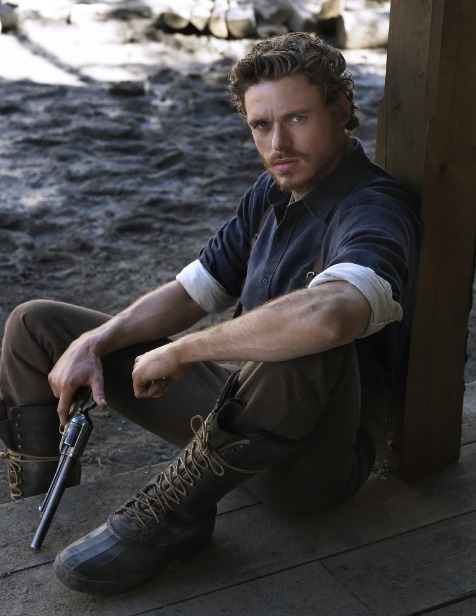

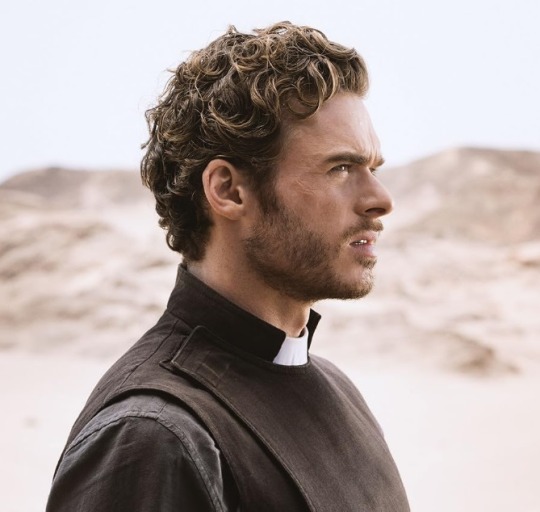

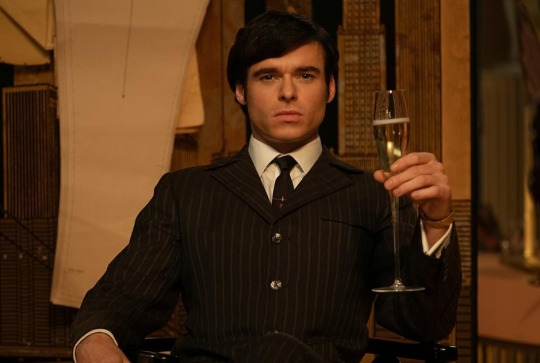
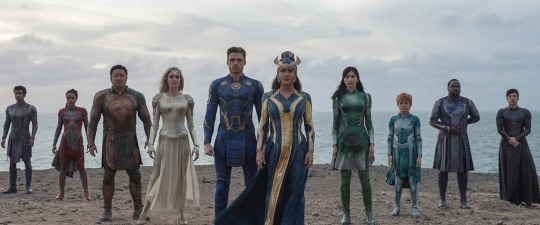


Happy Birthday Scottish actor Richard Madden born June 18th 1986 in Elderslie.
Richard was raised by his mother, Pat, a classroom assistant and his father, Richard, who worked for the fire service. He also has two sisters, Cara and Lauren.
His parents were “hippies”, he says, and their house was pretty open, with friends always piling in for big vegetarian meals. Madden spent a lot of time outside, in the woods behind their house. He has several injuries: he shows me where he shot his dad’s old air pistol and blew off part of his finger, then managed to wreck the same finger when he nailed a wooden plank to his skateboard, then crashed it, so apart from the Hippie parents it was much like most of our own days as bairns.
Despite growing up wanting to be an actor, Richard was very shy during his childhood. To overcome this, at age 11, he joined Paisley Arts Centre’s youth theatre program. In 1999 he was given the lead role as Sebastian Simpkins in BBC1’s children’s TV comedy series Barmy Aunt Boomerang, that’s him aged 12 in the first pic with co-star Toyah Wilcox.. By 2000, he’d made his feature film debut in the Iain Banks adaptation, Complicity.
After high school he was accepted to the Royal Scottish Academy of Music and Drama in Glasgow, Scotland and in 2007, he graduated.
Less than two years later, Richard had a recurring role as Dean McKenzie on the 2009 BBC series Hope Springs. Soon after, he landed the role of Ripley in the 2010 movie Chatroom, a film about a group of teenagers who encourage each other’s bad behaviours after meeting online. In the same year, Richard played punk band Theatre of Hate singer Kirk Brandon in Worried About the Boy, a TV film about the life of British singer-songwriter Boy George.
In 2011 Richard landed his breakthrough role as Robb Stark in the HBO fantasy-drama series Game of Thrones. Also in 2011, he played gay paramedic Ashley Greenwick on the short-lived British comedy-drama Sirens. During hiatus from filming Game of Thrones in 2013, Richard was cast to star as Prince Charming in the 2015 Disney film Cinderella.
Richard won his first Screen Actors Guild award in 2014 for the Discovery Channel mini-series, Klondike. He played Bill Haskell, one of two adventurers who travel to Yukon, Canada during the Klondike Gold Rush in the 1890s. He further enhanced his reputation as a good actor when he appeared in the BBC drama Bodyguard in 2018, the following year he played Lieutenant Joseph Blake in the film 2017 and was Elton John’s manager/lover in the biop of the star Rocketman.
In January 2019 Madden won a prestigious Golden Globe for his role as war veteran David Budd in the BBC show Bodyguard. He also appeared in the 2019 war movie 1917.
We last saw Richard in the movie, Eternals, which was okay, but nothing great, he is one of several actors being touted as the next James Bond,
Last year Richard starred in the Amazon Prime series Citadel, I've watcheit and was not really impressed with it,I think he does pull of the American accent well, but I noticed there have been people saying he doesnt, Madden revealed he spoke in the accent for two years straight to prepare for the series. The show has been earmarked for a second series. Richard is set to appear in the feature film Killer Heat next, it is in post production.
In July 2019, Madden received an honorary doctorate from his alma mater, the Royal Conservatoire of Scotland. When asked about his personal life during a New York Times interview following speculation about his relationships and sexuality, Madden stated: “I just keep my personal life personal.”
Madden was recently named one of ‘Scotland’s Sexiest Men' following a new study that identifies the most attractive features for men, he has competition though, also in the running are Bathgate’s David Tennant and Glasgow’s James McAvoy,
Richard, quizzed on what he would like to do next he sad “I’d like to do something in comedy. It’s nice to not… I mean we go to work every day and we’re like, ‘You’re gonna die today,’” he said, adding that he wanted to “do something fun for a minute.”
33 notes
·
View notes
Text
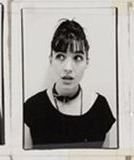
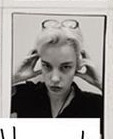
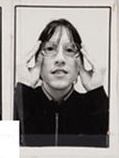

bikini kill (kathleen hanna, kathi wilcox, billy karen, and tobi vail) portraits by Sophie Howarth, taken at the 1996 summersault festival.
"Summersault Tour Portraits 1995 - 1996 Australia. I created this artwork as a gift for Stephen Pavlovic whose personal archive is currently featured in the Powerhouse Museum's Unpopular exhibition (along with some of my own archive, this artwork included.) On display in all its aging glory, the original, with discolored sticky tape and my 90s hand-writing (which I notice has evolved over the years), hangs well 30 years on. The portraits were taken of the Summersault Festival tour party December 1995 - January 1996 and show artists and tour workers; band members, catering team, tour managers, staff from Pav’s office, DJs, skaters, boyfriends, girlfriends, Maurice the nanny, Rancid fitness trainer, friends and more."
#unpopular#kathleen hanna#kathi wilcox#tobi vail#bikini kill#billy karen#summersault festival#1996#the beastie boys are there too so yall can go look at them<3#Sophie Howarth#96 AU TOUR
72 notes
·
View notes
Text
President Donald Trump on Tuesday signed a sweeping executive order bringing independent agencies under the control of the White House — an action that would greatly expand his power but is likely to attract significant legal challenges.
It represents Trump’s latest attempt to consolidate power beyond boundaries other presidents have observed and to test the so-called unitary executive theory, which states that the president has the sole authority over the executive branch. And it reflects the influence of Russ Vought, Trump’s budget chief, one of several conservatives in his orbit who have called for axing independent arms of the executive branch.
The theory was long considered fringe, and many mainstream legal scholars still believe it is illegal, given that Congress set the agencies up specifically to act independently, or semi-independently, from the president. These include the Federal Communications Commission, the Federal Trade Commission and the Securities and Exchange Commission, all of which enact regulations and can impose hefty fines on businesses that violate the rules.
Other presidents have not only declined to challenge the independence of these agencies in court, but have in many cases tried to avoid even the appearance of interference in their actions. Many leaders appointed to the agencies serve terms that last longer than a single presidency, in an effort to help shield them from political pressure.
The order would take that independence away by granting Vought, who reports to Trump, supervising power.
The executive order requires Vought, as the director of the Office of Management and Budget, to “establish performance standards and management objectives” for the heads of independent agencies and “report periodically to the President on their performance and efficiency in attaining such standards and objectives.” It also requires Vought to review and make changes to the agencies’ budgets “as necessary and appropriate, to advance the President’s policies and priorities.”
“For the Federal Government to be truly accountable to the American people, officials who wield vast executive power must be supervised and controlled by the people’s elected President,” the executive order states.
While the executive order is sweeping in nature and represents a fundamental reshaping of the federal government, it effectively codifies actions the Trump administration has already been taking, setting up the administration’s legal position in an expected court fight. Trump has, for instance, already fired Gwynne Wilcox, former chair of the National Labor Relations Board, the NLRB’s general counsel, Jennifer Abruzzo, and Office of Government Ethics Director David Huitema. Wilcox has filed a lawsuit contesting her dismissal.
And Vought, almost immediately upon taking office, assumed the title of acting director of the Consumer Financial Protection Bureau, another independent agency, halting further funding to the agency and firing its employees en masse.
But the order has broad — and potentially immediate — implications for a host of other independent agencies that have not yet been penetrated by the administration. And while it doesn’t apply to the Federal Reserve’s handling of monetary policy, it does apply to the Fed’s other responsibilities, including overseeing banks and other financial institutions.
Independent agencies often find themselves in the political crosshairs, either because they take actions that appear to align or conflict with a sitting president’s agenda. Those include the SEC’s efforts during the Biden era to force companies to disclose the risks they face from climate change, as well as the FCC’s more recent actions to investigate companies such as CBS for alleged bias against Trump during the 2024 campaign.
Under the order, independent agencies must appoint White House liaisons and “regularly consult with and coordinate policies and priorities” with not only Vought’s office but the White House Domestic Policy Council and National Economic Council.
It also neuters the agencies’ attorneys by asserting that “no employee of the executive branch acting in their official capacity may advance an interpretation of the law as the position of the United States that contravenes the President or the Attorney General’s opinion on a matter of law.”
Trump had made less dramatic intrusions into independent agencies’ power during his first term, including by pressuring both the FTC and FCC to punish social media networks accused of censoring conservatives — including himself.
In one episode that made headlines, Trump met with then-FTC Chair Joseph Simons in the White House and pushed him to take action on the censorship allegations, as POLITICO reported in August 2020. Simons had told lawmakers he considered the matter outside the agency’s jurisdiction.
Trump also stunned lawmakers that year by withdrawing the renomination of Republican FCC member Michael O’Rielly, who had expressed skepticism about using his agency’s powers to penalize online platforms for alleged ideological bias.
“I shudder to think of a day in which the Fairness Doctrine could be reincarnated for the internet, especially at the ironic behest of so-called free speech ‘defenders,’” O’Rielly said in a speech a few days before Trump pulled the plug on him.
The GOP-held Senate swiftly confirmed Trump’s replacement for O’Rielly, fellow Republican Nathan Simington.
In contrast, former President Barack Obama faced complaints from Republicans when he took actions that appeared to blur the lines between White House policy and the agencies’ decision-making. Those included Obama recording a video message in 2014 to urge his FCC chair to adopt strong net neutrality regulations, as well as a 2011 White House visit by Obama’s FTC chair on the same day that senior Google officials — whose company was under an antitrust investigation — were on the premises.
7 notes
·
View notes
Text
Democracy Docket
Marc Elias
Wednesday, February 5
Senate confirms Pam Bondi as attorney general
The Senate confirmed Pam Bondi as U.S. attorney general last night. Her record as an election denier and loyalist of President Donald Trump raises serious concerns over her ability to uphold justice, protect democracy and lead the nation’s top law enforcement agency.
Building youth engagement in democracy goes beyond voting
The future of democracy relies on more than just young people voting. From voter education to community building, the youth's commitment to civic engagement is what will ultimately drive positive change, IGNITE National fellow Grace Edwards argued in a new piece.
We're currently tracking 23 lawsuits holding Trump accountable — with new developments happening quickly. If you know someone who wants to stay informed on these important updates, forward them this newsletter to ensure they're in the know.
THE OPPOSITION
Holding Trump Accountable
Federal unions sue DOGE over Department of Labor data access
Federal unions, represented by Democracy Forward, sued today to block Elon Musk’s DOGE from accessing sensitive Department of Labor data. This marks the latest lawsuit against the faux agency for attempting to unlawfully obtain government information.
Judge issues nationwide block on Trump’s birthright citizenship order
A federal judge in Maryland issued a nationwide block today on Trump’s executive order to end birthright citizenship as litigation continues, saying it "conflicts with the plain language of the 14th Amendment."
Trump’s firing of NLRB member is being challenged in court
Gwynne Wilcox, who Trump fired from the National Labor Relations Board (NLRB), filed a lawsuit challenging her dismissal. She said the termination violated the National Labor Relations Act, which says NLRB members can only be fired for negligence or malfeasance after proper notice and the right to a hearing.
Hearings coming up tomorrow
A Washington state court is set to hear a lawsuit challenging Trump’s birthright citizenship executive order. Democratic attorneys general in four states argued that the order violates the 14th Amendment. This is one of nine lawsuits challenging this order.
A hearing will be held in two lawsuits from FBI agents seeking to block the U.S. Department of Justice from creating a list of staff who worked on Trump's Jan. 6 cases. FBI employees argue that these actions violate the U.S. Constitution.
A hearing is scheduled in a Democracy Forward case challenging the Office of Personnel Management’s “Fork in the Road” directive giving federal government workers the option to resign by tomorrow but be paid until September. The plaintiffs argued it’s the “pretext for removing federal workers on an ideological basis.”
This is a daily newsletter that provides a quick and easy rundown of the voting and democracy news of the day. For questions about your subscription or general support, visit our FAQ page here.
7 notes
·
View notes
Text
Perfectly Flawed - Chapter 23
word count - 1.9k warnings - one curse word Summary: Lina, Penelope, and Spencer uncover some things…
As Gideon and Elle head towards Hotch to fill him in on what we've learned, I rush back to the room Penny and I are in, eager to see what other information can be uncovered. I'm walking in and about to start searching for answers to the latest questions we have when I nearly run into Spencer, who says, "Lina! You're back! Hey, Garcia, she's right here!"
Entering the room, with Spencer right behind me, Penny spins in her chair to face me and says, "Ah! There's my right-hand woman. Lina, what did you find out while you were out?"
"Uh, h-hang on, Pen...Spence, did you want to read this real quick? I think I took some decent notes..." I say, handing him my notepad as I quickly start looking up any info I can find on these five people, starting with Roxanne Waters.
"Y-yeah...wow, these are pretty thorough..." I hear him mumble as I start pulling up what Ms. Waters has been up to since high school.
As Spencer brings Penny up to speed, I find that Roxanne's been bouncing from one thing to another, first with different majors in different colleges, never finishing more than a semester in any one program, to different jobs within the same company.
"How has she been able to stay with the same company, yet gone through so many different jobs?" I muse to myself, nodding when I see her father owns the company. "Hmm, makes sense..." I say, sighing.
"Uh, here's your notepad, Lina," Spencer says, setting it on my desk and pulling up a chair as Penny wheels over to see what I've come up with.
"Ah, checking out the resident Mean Girl, Class of '96?" Penny says, looking over at my screen.
I nod and hum in acknowledgment. "Mmm-hmm. Seems like she was kinda...flitting from one thing to another, never committing, until...I don't know, maybe her parents got fed up and just gave her a job? See? That's her dad's modeling company," pointing at her workplace files. "But she's still going from one thing to another, an assistant to everyone from the CEO to the various managers..."
I bite my lip, and Penny asks, "What were the jobs of the first two victims?"
As I pull it up on my screen, Spencer quickly reads, "Ashley Naldi is a journalist, and Jennifer Wilcox is a fashion designer."
"Looks like Ms. Naldi works at Vogue, and Ms. Wilcox just had some of her work featured in the October issue," I say, scrolling through the information, stopping when I see something that could be damning.
"Says here the models were from the Waters' agency, it's possible Ms. Waters was there during that shoot..." I say, cross-referencing between different windows, trying to see if any of the dates line up.
"Found something! October 11th through 15th, some receipts indicating Ms. Waters stayed at a hotel in the same city where the photo shoot was taking place!" Penny says, turning from her computer to look at us.
I hum and say, "Yeah, but the shoot was for 2 weeks, she left after one? Did different models come in?" I continue scrolling through receipts and plane tickets, following the trail. "No, it's looking like she was the only one to leave, and someone else from the company came in to finish the shoot in her place..." I reveal.
"Do you think something happened to make her leave or need to be replaced?" Spencer asks, looking over from my screen to Penelope's.
"Not sure, but that's something else to add to the list of questions..." Penny says, tapping on her keyboard.
"Do we know what hotel Ms. Waters is in while she's here?" Spencer asks, and I quickly pull it up.
"Yup, seems she's staying at the same place the reunion's being held, the Ritz-Carlton," I tell him, starting to check on where Sabrina Sadler and Lucas Davies are lodging as well.
"You checking the areas for the profile there, Reid?" Penny asks, turning in her chair to look at him.
He hums and starts, "Mmm-hmm. Hey, Lina, where are Sabrina Sadler and Lucas-"
"-Davies staying? Already got it. Ms. Sadler is at The Georgetown House, and Mr. Davies is at the Sonder Georgetown C&O." I cut in, getting a smile from him when I turn to face him. I blush and shrug, saying, "I...kinda figured it'd be prudent to look up where they were staying too, just in case."
He continues grinning at me for a moment, then goes back to the map he has spread out on a spare table, marking all the relevant spots. His mouth bunches up to one side, deep in thought.
"What are you thinkin', Doc?" I ask him, turning around in my chair to face him.
"The crime scenes aren't that far from each other, so the unsub is probably somewhere in the 1 to 5-mile radius. It's more likely they're closer rather than farther away..." he says, tracing over the map with his fingertips and frowning slightly.
"That's good, right? Less area to cover to find the unsub?" I ask.
"In theory, yes. But this part of the city is so densely packed with people, it'll be near-impossible to keep people away to properly comb the area to find him..." he says.
"But, they're still gonna send people to patrol it, right?" I ask, standing up to look over at the map.
"Well, probably for at least a little while, if only as a precaution so there aren't any more attacks," Spencer says, sighing and sitting down in a nearby chair.
Penny looks over at us and says, "Hey, why don't you two go get some coffee, maybe grab something from the vending machine, and I'll tell Hotch and the others what we've found,"
I look over at Spencer, then back at Penny, and ask, "Um, are you sure? Shou-shouldn't we stay here, try to find anything else?"
She gives me a smile that's more of a grimace and says, "Well, for the time being, we're kind of...on pause. Until something happens, or someone decides to offer any more information, we're kind of on standby."
Spencer looks over at me and shrugs, then turns to Penny and says, "Alright. We'll be back. Thanks, Garcia."
Smile growing wider and more playful, she says, "Well, if you really want to thank me, you can grab me a pack of Skittles from the vending machine," and hands him some change for the machine.
I grin and grab some money as well, and say, "Yeah, that's doable. Be back in a bit, Pen."
Following Spencer out of the room, we make a stop to grab some coffee, then head to the vending machine. Spencer gets Penny her Skittles, and I spot a pack of Twix and swiftly punch in the code for it. After I retrieve and open it, I ask, "Hey Doc, want one?" holding the package out in offering.
He gives me a small smile as he deftly snags one of the bars, giving me a quiet, "Thank you," as we head back.
I grin and say, "No problem, Doc." taking a bite from my bar.
After we head back to Penny, Spencer hands her the Skittles, which she gleefully takes, ripping the bag open. "Have I ever told you that you're my favorite doctor, Reid?" I give Penny an amused look, raising my eyebrows. She gasps and says, "Ohmigosh, that's right! There are two of you now! Sorry, Lina!"
"It's ok, Penny. Just means I gotta work harder," I say with a small laugh.
"Well, far be it from me to try to deter you from that..." Penny says, grinning.
Hotch then comes in, giving a quick, hard rap on the door, and says, "Reid, Garcia," He takes a small pause, then adds, "Aschebrooke. You all can head home, but safe to say we'll be coming back in tomorrow. Rest up, we're going to need to bring our A-game to find this unsub before he does more damage."
"Will do, Sir," Penny says, as she starts putting the computers on standby for the night.
Grabbing my purse again, I help Penny with the computers, as Spencer leaves the room with Hotch. After everything is set for the night, Penny and I make our way to the elevators, and on the way there, I see Hotch talking to Spencer, a hand on his shoulder. Spencer nods and gives him a tight smile, then walks towards the elevators, satchel slung across his body.
We take the elevator down and, waving to Penny as we leave, Spencer and I start walking to the station. As we walk I ask him, "You ok, Doc?"
"What do you mean?" he responds, hands in his pockets.
"Dunno, guess I'm just...checking in? I don't know about you, but I'm going to try my best to get those crime scenes out of my head so I can sleep tonight." I say quietly.
His demeanor softens, and he takes his hands out of his pockets and runs a hand through his hair. "Yeah, it's...quite a lot at first. Sorry to say it, but you tend to get used to it after a while."
"Well, I know I'm new to this, but, if you need to talk about anything, or just...need to get your mind on lighter topics, you can text or call me," I tell him, smiling gently at him.
A small smile emerges on his face, and he says, "Thank you but, shouldn't I be saying that to you?"
I shrug and say, "I suppose, but that's...just...kind of what I do,"
"On a different note, you're going to be able to sleep in your own bed tonight instead of in a hotel, so that's gotta be a nice change, right, Doc?" I say, which causes Spencer to give a small chuckle.
"Yeah, that is going to be nice, I've got to admit!" he says, grinning.
Reaching the station, we go to sit on the bench to wait, but the Metro pulls up, and instead, we board and sit down. Letting out a small breath, I gently rub at my temples and stretch my neck to loosen my muscles, then turn to look at Spencer.
"So, your usual tomorrow?" he asks me. I nod and go to tell him he doesn't have to, but he stops me and says, "I've gone a week without a coffee buddy, I'll gladly get yours, too. And some decent coffee, at that."
I flash him a smile and say, "Thanks, Doc. No one else would drink coffee with you?"
He sighs, shaking his head and saying, "Not really. Not after the first cup, at least."
I snort and say, "Ah, well, there is that..."
Riding in silence, I see my stop coming up, and, signaling for the Metro to halt, I give Spencer a small wave and tell him, "I'll see you tomorrow, Doc."
"I'll see you tomorrow, Lina," he says, returning the wave with a small smile as I head off the vehicle and start on my way home.
Previous chapter
Next chapter
Story masterlist
#spencer reid#dr spencer reid#doctor spencer reid#criminal minds#criminal minds fanfiction#criminal minds fanfic#matthew gray gubler#mgg#spencer reid criminal minds#spencer reid fanfiction#spencer reid x ofc#spencer reid x original female character
2 notes
·
View notes
Text
Literally leaving the country next week so I doubt I'll get shit all time for writing but I was busy cracking myself up at lunch so I figure I'll just put that here for the feeling of satisfaction.
It was difficult to manage any kind of sensible thought against this persistent feeling of wonderment. He felt shaken yet stilled by it even when he woke up. Winnowed down to his very core. He’d never loved someone this way in his life, not that it was something that needed admitting, but here it was, apparently possible to do so more.
Why shouldn’t he admit it, he thought, suddenly. It wasn’t on principle in general that he didn’t announce it. He had no trouble being clear. No, rather it was just that those specific words felt like losing ground in a situation in which it was crucial that he didn’t. As if the thing itself depended on not saying it.
No matter. Billy was still sleeping. He looked so lovely when he slept on Kaua’i. The scrunched up worry he’d used to carry over even to dreams was gone now, and he simply looked sweet and peaceful. Cornelius’ impulse was to kiss and kiss and kiss him, to feather his beautiful face with the lightest of touches, until there was nothing else in the world but their kissing each other.
There were, however, other things to think about.
As, for example, this situation with the white sugar and the Naval issue regalia.
Which he had promised not to interfere in.
But had he? Really? He had promised not to interfere in Billy’s employment, as spurious and doubted a promise as it was, but did that count for the other things? He could maintain an acquaintance with Mr. Wilcox as a separate matter, could he not?
He remembered then that Wilcox meant to visit the refinery here again today, at such time as which he would quickly discover that there was not and had never been an English Mr. Cook in their employ (unless there was, of course, but it would be impossible to be that lucky. And Cornelius was not a servant. Either way, Henry Wilcox would recognize his face.)
He felt sure he could work around that somehow. The need to lie low today and the need to find out more were in sharp competition, but this was the sort of problem a man lived to solve.
7 notes
·
View notes
Text
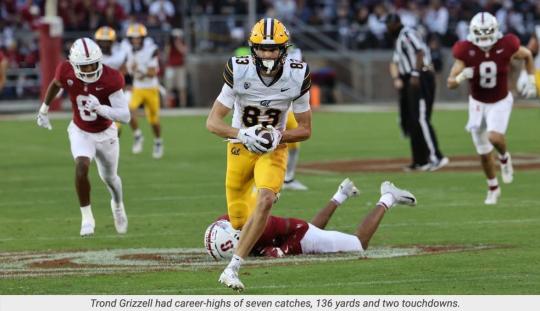
Griz the Bear Leads Cal to Big Game Win
Golden Bears Continue to Own Stanford
PALO ALTO - It may not have been quite as dramatic as Chase Garbers' game-winning touchdown run in 2019, but Trond Grizzell - a walk-on who had played a grand total of one career snap heading into this season - added "Big Game Hero" to his growing resume on Saturday.
The Cal wide receiver caught two touchdown passes - part of a career-defining performance - and the California football team won its third Big Game in a row with a 27-15 triumph over Leland Stanford Junior University at Stanford Stadium. The game was even more lopsided than the score indicated, as a successful 2 point conversion by the Bears was erroneously negated by the referees and a last minute sure touchdown was sacrificed by Jaydn Ott (who decided to take a knee instead at the five-yard line to burn clock instead of score) which would have made the score at least 36-15.
Grizzell caught scoring passes of 9 and 54 yards and finished with career-highs of seven catches and 136 receiving yards, as the Golden Bears won the Big Game for the fourth time in five years, the longest win streak by California since the Jeff Tedford era. Cal has also not lost at Stanford since 2017. But perhaps more importantly for the Bears than their mastery over their rivals down on The Farm is the fact that they remained bowl-eligible with the win.
"It was a big day - dare you say, 'Big Game Hero'," Travers Family Head Coach Justin Wilcox said. "He's going to be in the conversation. From a year ago, Trond has made as big a jump as anybody. He cares deeply about football and the team. It matters to him, and it's great to see a guy like that who puts in the work."
Grizzell's touchdown grabs helped the Bears (5-6, 3-5 Pac-12) establish a 14-3 lead early in the second quarter. He also caught a 21-yard pass from quarterback Fernando Mendoza on a 4th-and-7 play in the fourth quarter that helped sustain a game-clinching scoring drive.
"Trond is a special player," said Mendoza, who won his first Big Game as Cal's starting quarterback. "He's a vertical threat, so we had a couple of plays drawn up for him. I regard Trond as one of my best friends. We built amazing chemistry together. So when he's out there, I trust that I know what he's going to do."
Mendoza also set career-highs with 294 passing yards and three touchdowns, while running back Jaydn Ott was a workhorse with 166 rushing yards on a career-high 36 carries. Ott also went over the 2,000-yard rushing mark for his career (2,079).
"There are a lot of people who are part of this game. I've seen grown men on the field crying real tears," Ott said. "It means a lot. I got to see it last year, so I knew coming into this game how much it meant to people. I'm glad we came out on top."
Ott scored on a 1-yard touchdown run midway through the third quarter to help Cal build a 21-6 lead, but the Cardinal answered back with a Hail Mary pass (and its only touchdown of the game) to cut it to 21-12. They then managed to hit a second very long field goal (of 53 yards - they had earlier scored on a 50 yarder) near the end of the third quarter, but would get no closer as the Bears proceeded to grind yards and pull away.
California put together the pivotal drive of the game, marching 75 yards on 13 plays and scoring the game-clinching touchdown on an 8-yard pass from Mendoza to Jeremiah Hunter early in the fourth quarter. After Stanford failed to answer and turned the ball over on downs, the Golden Bears managed to burn nearly 7 minutes of clock on their last drive - including Ott's unselfish play of breaking away for a sure touchdown run but stopping at the 5 yard line and taking a knee with a little over a minute left in the game. "I didn't need to score again," Ott said. "I would rather not give them back the ball then just make another touchdown."
"It's a huge win - obviously for the team's goals but also the Cal community, the players, the student body," Wilcox said. "I don't know there's a better 30 minutes to an hour in the year than when you win the Big Game and retain the Axe. It's a great feeling and I want the guys to enjoy it."
Wilcox improved his coaching record in the Big Game to four wins with only two losses - one of which happened in a 24-23 heartbreaker in 2020 where the Bears had more than half their starters out due to strict Covid protocols from the University during the pandemic, while Stanford kept out no players for the contest. It was later revealed that more than a dozen of the Cardinal starters had tested positive either immediately before or shortly after the game.
The Golden Bears close out the regular season on Saturday at UCLA at 7:30 p.m. on ESPN. Cal will be going for their third win in a row and will become bowl-eligible with a victory.
#Go Bears!#This is Bear Territory#UC Berkeley#Roll on you Bears#Cal football#Go Bears#Beat Stanford#We've STILL got the Axe
17 notes
·
View notes
Text
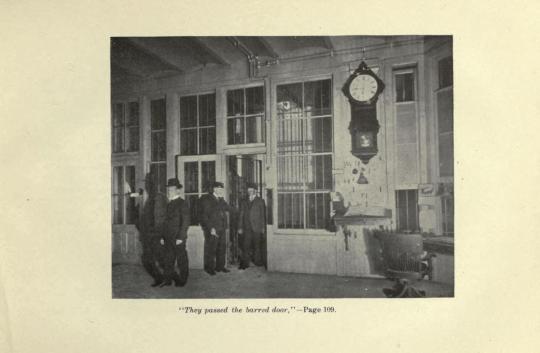
"Nevertheless, the system persisted, and without basic changes. For all the public clamor and widespread dissatisfaction, parole survived relatively unscathed. How could failure and unpopularity have had so little impact on the continuity and structure of policy? The answer is to be found, first, in the functions that the program did fulfill for several types of officials within criminal justice. The day-to-day advantages that they gained from administering the system far outweighed (for them) its apparent defects.
The most vigorous champions of parole, those who gained the most from its operation, were the prison wardens. Their support was critical to the survival of the system and it was unwavering, despite some gradual diminution of their authority over parole decisions. Before 1925, wardens dominated the parole boards. They usually served as one of the three members; the meetings were held on their grounds, at the prison; and at least at the start, the inmate’s record of institutional conduct probably counted for most, if for no other reason than as a carry-over from the time when parole was defined as a reward for the good inmate. After the mid-1920’s, however, the parole system built up its own bureaucracy. It became more independent of the department of corrections and moved away from the warden’s direct control. He no longer served on the committee, the final decisions were more frequently made in the state capital, and institutional behavior ranked well behind an inmate’s prior record in importance as a release consideration.
As Warden Lewis Lawes of Sing Sing told a New York investigatory committee:
‘I have never attended a meeting of the Parole Board. I have never been requested to. . . . I did attempt at first to make a good warden’s report and recommendation; but when I found they didn’t read it or pay any attention to it I will admit my efforts became very perfunctory.’
The Wilcox study in Pennsylvania found that “good conduct in prison does not inevitably lead to parole, nor do minor disciplinary infringements always prevent release. Eighty percent of those paroled at the minimum had perfect prison records. But it is also noteworthy that 80 percent of those refused parole had maintained good conduct in prison.” And the Attorney General’s survey cautioned that
Parole should not be used as a device for solving some of the problems of prison administrators. Prison administrators . . . are liable to employ it as a good time regulation or reward rather than as a correctional device.
Nevertheless, wardens had good reasons to continue to support the program and to resolve in their national meetings that parole was “an essential element in protective penology.” Some of them did manage to keep the boards under their sway: in such states as New Hampshire, Connecticut, and New Jersey, the warden still had the most to say about who went out on parole. In many cases, too, a warden could persuade a board to take into account his own prejudices in any one particular instance. Hence, the following dialogue in the Montana parole board meeting:
Case of Fred Albo, a Mexican, was considered. The Clerk read the history. Governor: Hold him I think. Secretary of State: Go to it. Attorney General: It makes no difference if he is a Mexican. Clerk: The Warden hates Mexicans and recommends him. He must be a good man. Governor: All right, don’t hold him.
(One cannot be certain, of course, whether the warden was very impressed by this inmate or whether he simply wanted to get rid of a noxious Mexican.)
More important, whatever the boards assumptions about the significance of the prior record, the warden could thwart the opportunity for release for any especially troublesome inmate. Boards would not pay attention to minor infractions or necessarily release someone who minded his own business inside. However, the inmate who was far out of line would suffer, and wardens as well as convicts understood this. Wardens, or their principal keepers, were very often present throughout board deliberations; but at any rate it was they who made up the dockets and so they had ample opportunity to tell the board about the bad cases. In Pennsylvania, for instance, the inmate who “carried coffee from the mess hall, cursed an officer, refused to enter his cell, and stole and drank shellac,” did not win release at the minimum. In effect, wardens had a veto power, and their ability to blackball was sufficient to serve their own disciplinary ends well.
“Complex and difficult as is prison management under the best conditions,” insisted one Indiana official, “it would be immediately more difficult without the parole law. The prisoner looks upon the parole as the reward for good conduct and steady industry and does his best to earn it.” Or, as Pennsylvania’s Wilcox concluded: “The power possessed by the state under parole laws . . . provides penal administrators with a club which is even more effective than the old ‘good time’ laws in inducing internal discipline. Prison managers generally favor parole for this reasons.
Moreover, wardens found themselves locked into the system once it was in operation. They were compelled to favor its perpetuation for the critical reason that any talk of a diminution in the availability of parole (let alone its outright abolition) provoked substantial inmate hostility - and wardens did not enjoy suppressing riots. Under indeterminate sentences, any effort to restrict parole had to mean significant increases in time served. Almost invariably, then, wardens were eager to see more and more paroles granted to keep peace among the inmates. Joseph Moore, chairman of the New York State Board of Parole, complained that wardens were directing inmates’ anger at parole boards and away from themselves. “The Parole Board finds it advisable to hold a large percentage of prisoners beyond their eligibility for release and we have abundant evidence that prison officials disapprove of this. Unfortunately, this feeling whether purposely or not is conveyed to the prisoners and it is permitted to be a general idea among them that so far as the prisons are concerned they would be glad to release them but the hard-boiled Parole Board holds them up.”
In much the same way, the warden of the penitentiary in Washington State kept up a running battle with parole board members. Because they were (in his view) too strict about release, his own job of preserving good order was more difficult. In fact, the warden “usually placed about five or ten men on the Docket who had served a long time, but who had no present chance for release. Why? Because when a ‘con’ has put in a lot of time and is denied any chance for a hearing before the Board, resentment occurs, and if there is enough of that, trouble occurs inside.” That same warden resisted all efforts to abolish parole for three-time losers: “Such prisoners could not be controlled . . . [and prison administration would be impossible.” The warden of the Illinois State Penitentiary at Stateville, to choose one case from many, knew the truth of that argument first-hand: in 1937, responding to a newspaper crusade, the parole board cut back on releases (granting only 3 from 274 applications), and in short order the warden had to contend with a hunger strike. Or, to turn the point around, the warden at Charlestown, Massachusetts, consistently recommended parole “because he expected it to improve discipline. He proved correct in his anticipation as there has not been a riot or outbreak in State Prison since parole went into effect.” In sum, the wardens were parole’s warmest friends. They supported the system and were eager to keep the numbers granted parole as high as possible - always excepting that cult case which had to be made into an object lesson.
Legislative committees investigating parole found the wardens’ conclusions not only well-taken but almost unanswerable. No matter how critical they were of one or another part of the system, they were reluctant to restrict release procedures for fear of undercutting prison officials’ power. The New York Crime Commission, a tough group with little good to say for parole, moved very cautiously for fear of disturbing the wardens’ authority. Not only the wardens but representatives of the state parole board took pains to inform the Commission just how critical parole was to discipline. “It is your opinion,” Senator Caleb Baumes, the chairman of the Commission, asked the head of the parole board, “that you create and maintain a better morale, if you please, amongst the prisoners generally, if they know that system is in vogue?” To which the chairman replied: “Absolutely.” The Commission accepted the argument, and as eager as some of its members were to abrogate the board’s right to release inmates immediately at the minimum, they did not dare do so. “If you tell 3,000 men in the prison,” concluded one of the most law-and-order-minded members of the Commission,
that they are likely to be held from months to five or six years more, you will make a hell on earth of every prison in the State. . . .3000 men expect . . . from all the years of practice by the Parole Board . . . that they will be released at the end of the minimum, and if you tell them that now it is likely or probable that their time will be extended beyond the minimum . . . they are going to insurge and feel vicious, and you can not blame them, no matter how heinous was their original offense.
His conclusion was clear: “If we are to go ahead on any rough and ready method of extending sentences and taking that definite hope away from them, the consequences will be extreme.” True, public opinion (and his own instincts as well) would prefer to “make them serve indefinitely.” But “we cannot do it without smashing prison discipline.” It was this kind of reasoning that helped to preserve parole, no matter how poor its reputation or inadequate its practice.
- David J. Rothman, Conscience and Convenience: The Asylum and Its Alternatives in Progressive America. Revised Edition. New York: Aldine de Gruyter, 2002 (1980), p. 183-187.
Image is from the Handbook of the New York Reformatory at Elmira, showing the parole board finishing a meeting and releasing an inmate - on the left hand side. c. 1916.
#penal reform#progressive penology#progressive politics#rehabilitation#penal modernism#american prison system#penology#parole board#parole#parole system#prison discipline#released from prison#prisoner release#history of crime and punishment#prison administration#academic quote#reading 2023#david rothman#sing sing prison#massachusetts state prison#stateville penitentiary
2 notes
·
View notes
Text



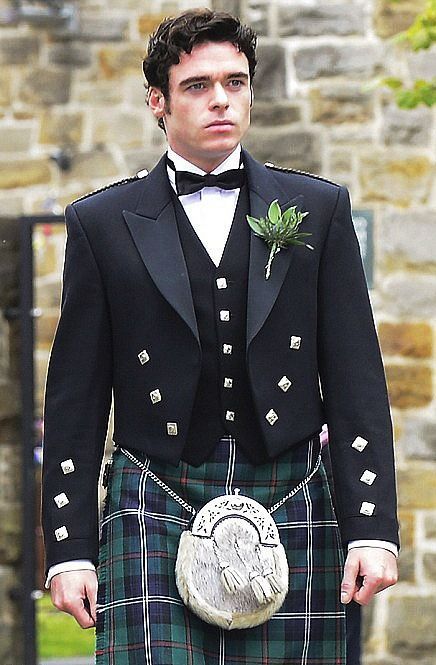
Happy Birthday Scottish actor Richard Madden born June 18th 1986 in Elderslie.
Richard was raised by his mother, Pat, a classroom assistant and his father, Richard, who worked for the fire service. He also has two sisters, Cara and Lauren.
His parents were “hippies”, he says, and their house was pretty open, with friends always piling in for big vegetarian meals. Madden spent a lot of time outside, in the woods behind their house. He has several injuries: he shows me where he shot his dad’s old air pistol and blew off part of his finger, then managed to wreck the same finger when he nailed a wooden plank to his skateboard, then crashed it, so apart from the Hippie parents it was much like most of our own days as bairns.
Despite growing up wanting to be an actor, Richard was very shy during his childhood. To overcome this, at age 11, he joined Paisley Arts Centre’s youth theatre program. In 1999 he was given the lead role as Sebastian Simpkins in BBC1’s children’s TV comedy series Barmy Aunt Boomerang, that’s him aged 12 in the first pic with co-star Toyah Wilcox.. By 2000, he’d made his feature film debut in the Iain Banks adaptation, Complicity.
After high school he was accepted to the Royal Scottish Academy of Music and Drama in Glasgow, Scotland and in 2007, he graduated.
Less than two years later, Richard had a recurring role as Dean McKenzie on the 2009 BBC series Hope Springs. Soon after, he landed the role of Ripley in the 2010 movie Chatroom, a film about a group of teenagers who encourage each other’s bad behaviours after meeting online. In the same year, Richard played punk band Theatre of Hate singer Kirk Brandon in Worried About the Boy, a TV film about the life of British singer-songwriter Boy George.
In 2011 Richard landed his breakthrough role as Robb Stark in the HBO fantasy-drama series Game of Thrones. Also in 2011, he played gay paramedic Ashley Greenwick on the short-lived British comedy-drama Sirens. During hiatus from filming Game of Thrones in 2013, Richard was cast to star as Prince Charming in the 2015 Disney film Cinderella.
Richard won his first Screen Actors Guild award in 2014 for the Discovery Channel mini-series, Klondike. He played Bill Haskell, one of two adventurers who travel to Yukon, Canada during the Klondike Gold Rush in the 1890s. He further enhanced his reputation as a good actor when he appeared in the BBC drama Bodyguard in 2018, the following year he played Lieutenant Joseph Blake in the film 2017 and was Elton John’s manager/lover in the biop of the star Rocketman.
In January 2019 Madden won a prestigious Golden Globe for his role as war veteran David Budd in the BBC show Bodyguard. He also appeared in the 2019 war movie 1917.
We last saw Richard in the movie, Eternals, which was okay, but nothing great, he is one of several actors being touted as the next James Bond,
James is currently in the Amazon Prime series Citadel, I've watched the first three episodes and am not really impressed with it,I think he does pull of the American accent well, but I noticed there have been people saying he doesn't pull it off, Madden revealed he spoke in the accent for two years straight to prepare for the series. The show has been earmarked for a second series. Richard is set to appear in the feature film Killer Heat next.
In July 2019, Madden received an honorary doctorate from his alma mater, the Royal Conservatoire of Scotland. When asked about his personal life during a New York Times interview following speculation about his relationships and sexuality, Madden stated: “I just keep my personal life personal.”
Madden was recently named one of ‘Scotland’s Sexiest Men' following a new study that identifies the most attractive features for men, he has competition though, also in the running are Bathgate’s David Tennant and Glasgow’s James McAvoy,
25 notes
·
View notes